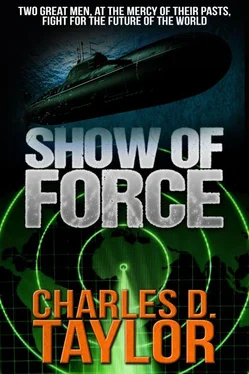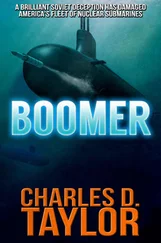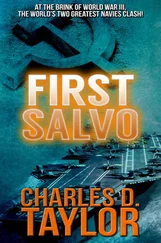Nothing had been like he expected. Their welcome was already in progress when they managed to land at Ton Son Hut shortly after the Tet Offensive began, the New Year's party that had amused Mundy. As they came in low for their approach, he could see sections of Saigon burning. The only information they had was the pilot's comment over the speaker that there was fighting near the airport and there was a possibility they might come under fire on their final leg of the approach, but he hadn't seemed concerned. He was probably a marine, too, David thought.
The moment the door to their plane opened, he knew they had arrived at the war. There was the smell of smoke in the air, and artillery explosions in the distance. Closer to the airport, they could hear small-arms fire, occasional shots for a few seconds, followed by rapid fire from a number of weapons. Well, he said to himself, I cut my own orders, so there's no one to blame but myself.
Inside the main building in the reception area it had been business as usual. Military and civilian personnel, both American and Vietnamese, went about their business seemingly unaware of what was going on outside. His processing was similar to landing at Kennedy after a European vacation, slow, methodical, disinterested — no one cared that Lieutenant David Charles had returned once again, this time as second in command of a riverine squadron.
There was no time for sightseeing. They were expected to report immediately to the base camp on the Mekong, where their headquarters were located. As David learned later, the Navy planned reliefs very tightly, and there were two officers very much looking forward to their arrival. When one was that short in Vietnam, after twelve months of surviving, they wanted to be relieved immediately, if not sooner, and turnover of command required a day or two of familiarization.
Once the Navy agreed that they really were who they said they were, a helicopter took them to their base camp, north and west of Saigon, well up the Mekong toward Cambodia. They flew over lush, green tropical forests, perfectly laid-out rice paddies that sometimes extended for miles, and little clearings that signified villages. This was the part he had rarely seen during his last tour. Previously he had been on the ocean, always returning to the coast, but rarely inland unless they had a few days off. And, then, they usually went no farther than downtown Saigon. Now, he realized, he would see the real Vietnam.
But up until now, he'd seen very little of the country. He had spent his time assisting Lieutenant Commander Mezey in setting up the camp as he wanted it run, which was one eighty out from the way the previous officer had set it up. The new CO figured that the Vietcong would know almost immediately that new management had come in and they would try a few night attacks to see how they were doing. Mezey simply didn't want his defenses set up the same way, since he assumed the Communists had probably memorized them. The second night after they relieved, the attack came. He had been right.
First came the mortars. Those were always the first warning of an attack. There was no noise until the first shell landed within the compound. Then all hell broke loose. Mortars from half a dozen different sites came roaring in, followed by the flares to illuminate the compound. Then, accompanied by the chatter of small-arms fire, the VC came running up the free paths between the mines they had previously charted. And the thing that saved the compound from much damage that night was that Mezey had made sure the first change was the location of the mines. Half a dozen mines were tripped, cutting through the attackers and stopping the second wave in mid-charge. Mezey, unfortunately, had been in the latrine at the time of the attack, and one of the early mortar rounds had landed nearby, close enough to jam the door. He began to rock the wooden structure to attract attention to his plight. Finally, it tipped over on top of its door. He later pointed out, to David's amusement, that the mortar shell had cleaned him out for at least a week, but it was a hard way to solve a problem. The attack was over as fast as it had begun. There were few casualties to the defenders and part of their luck, as Mezey had commented, was that they acted just like marines.
Each day they made a point of changing the defenses. It was just enough so the VC knew there were safer places to attack, and within a couple of weeks they decided they had a secure base. In the meantime, while the weather still held, they spent hour after hour learning their boats and running through exercises, until they finally passed the boring stage and became automatic.
Now he was staring out through the screening around their tent, watching the cloudburst that wouldn't stop. The monsoons had begun, and the dust turned to mud in no time. The only saving grace here was that even though they acted like marines, they really weren't. And he wouldn't change places with those poor bastards sitting in muddy trenches or slogging through inches of mud on another of their incessant patrols.
The rains continued, and with them the tedium. VC movements were limited, and the Americans were just as happy to spend more of their time patrolling the river and searching native craft for weapons, or anything else that might be smuggled.
Their PER riverboats added little to personal comfort, since they were essentially open to the rain. They were developed for high-speed combat in shallow waters. They had fiberglass-reinforced plastic hulls and ceramic armor, and carried a 60-mm.
mortar, a grenade launcher, and three .50-caliber machine guns. When they were traveling in excess of twenty-five knots, they were impressive to any VC they happened to be chasing, but they provided little protection from the elements, not to mention enemy fire. If David managed to board a boat dry, he found himself wet before they were away from dockside.
He and Mezey generally rode one of these open PBR's. On occasion they went in one of the Swift boats, which were even faster and had enclosed cabins. But more of the latter were being turned over to the South Vietnamese Navy, and the Americans took what they were allowed. So far, it was not the type of tour he thought he had written orders for.
"I think maybe we've got what we've been looking for, David." It was Phil Mezey's voice calling over the water, just returning from a conference downriver.
"Anything could be better than what we've been doing so far,". David answered. He had been supervising ammunition storage, and had found himself wondering why the hell the Navy was bothering to send them ammunition. David stepped in front of the sailor waiting for the line from Mezey's boat. He caught it easily as it snaked through the air, and looped it around the forward cleat. As the boat swung its stern in David took that line also.
"Right here. I think the answer's right here." Mezey swung off the ugly little PER onto the dock, waving a sheaf of papers. "There's some heavy troop concentrations up toward the border, and the Big Z thinks maybe they're building up for an offensive north of Saigon. Believe it or not, he thinks the best way to search for them is from the river. He's warned the generals that if they start sending reconnaissance aircraft and ground patrols in, all they're going to do is convince the VC to stay low until they're good and ready. And Washington can't stand any more surprises."
"And he picked us?"
"Well, not really. I kind of volunteered our services. I explained that we hadn't lost any boats. Our squadron was full and in excellent condition, and we knew that territory near the border like the back of our hand."
"Shit," David laughed, "we're in such damn good shape because we haven't seen any action. We haven't even scraped any paint. And, Christ, Phil, we haven't been within twenty miles of the border. That's a maze up there."
Читать дальше












